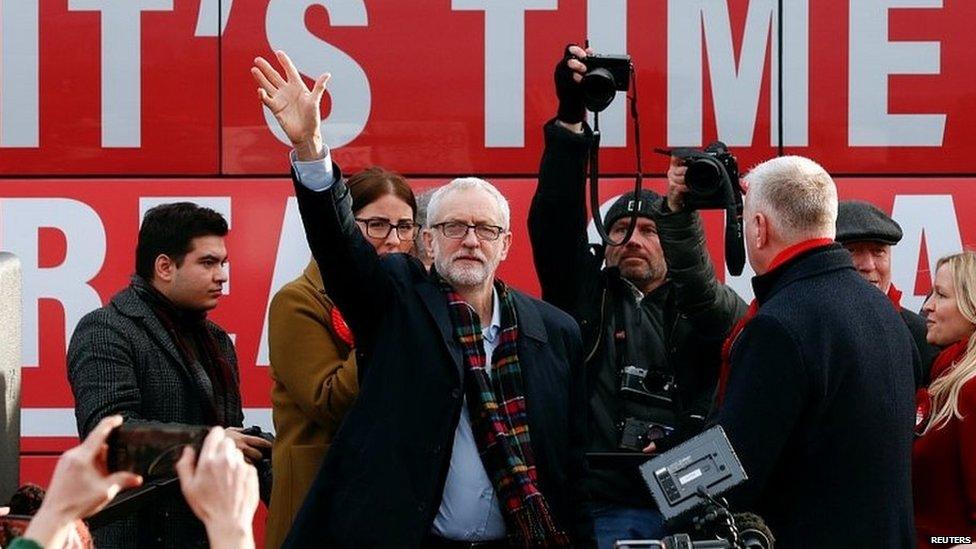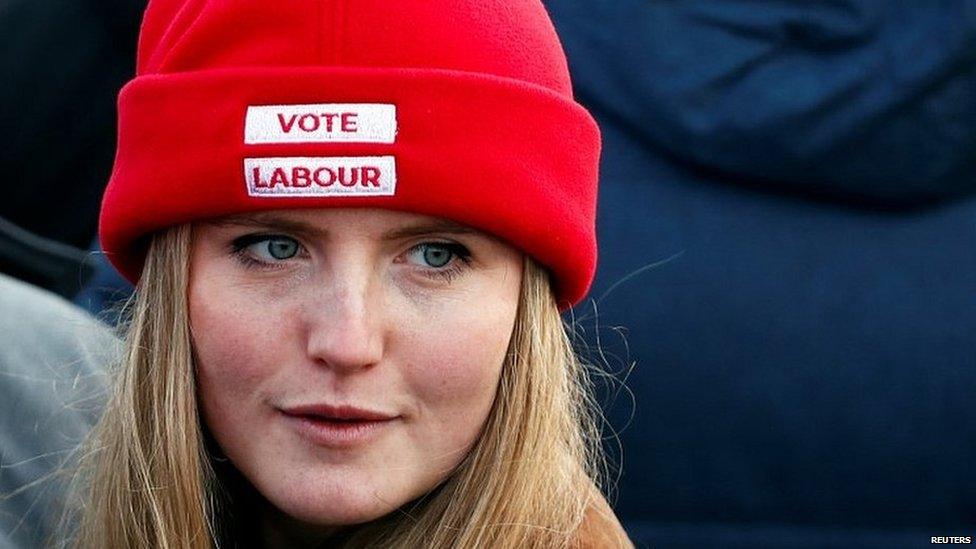Lord Ashcroft: Tory pollster's analysis of Labour defeat sparks internal debate
- Published

The report suggests many ex-Labour voters felt the party "looked down on people who disagreed with it"
A new opinion poll has thrown fresh fuel on the debate about why Labour suffered such a heavy defeat in December's general election.
A number of post mortems are already under way into the result, which left Labour with the lowest number of seats since 1935.
Labour's own internal review, leaked to the Financial Times, external, points the finger of blame at divisions over the party's Brexit policy - and dismisses criticism of its "radical" manifesto and leader Jeremy Corbyn.
The four contenders to replace Mr Corbyn as leader have each given their own version of what went wrong.
Now Lord Ashcroft - the millionaire former deputy chariman of the Conservative Party - has weighed in.
His poll of more than 10,000 people, including 18 focus groups in seats Labour lost, suggests the party's muddled stance on Brexit was a major factor in its defeat.
But the most popular reason for deserting Labour for the Conservatives or Lib Dems was "I did not want Jeremy Corbyn to be prime minister".
More than half of those surveyed for the Diagnosis of Defeat, Labour's Turn to Smell the Coffee, external report said not believing Labour would be able to deliver on its promises - and no longer feeling the party represented them - also played a part.
The report's conclusions echo those from YouGov's polling of 500 people shortly after the 2019 election, external, which identified the party leadership and Brexit as the two most important factors in voters turning away from Labour.
Lord Ashcroft is not a member of the British Polling Council, which sets standards for the industry.
But his polls are closely watched at Westminster because of the size of them and the fact that they are carried out at constituency level, something of a rarity in British polling.
He said some on the left were bound to dismiss his findings because he is a Tory, but he said he wanted a strong opposition party, adding: "You don't have to trust me - just listen to what real voters have to say in the research."
Voters who deserted Labour for the Lib Dems or the Conservatives were asked by Ashcroft's researchers to select from a list of reasons:
53% selected Jeremy Corbyn's leadership
30% said they wanted to "get Brexit done" - a key Conservative pledge
Three-quarters of those who switched to the Conservatives said keeping Mr Corbyn out of No 10 was the reason
73% of Labour to Tory switchers said they wanted to "get Brexit done"
More than half of those who backed Labour at the 2017 general election, only to desert it two years later, agreed that Labour would need to change "very significantly" before they considered voting for them again


After three Conservative election defeats, in 2005 Lord Ashcroft wrote a stinging report, entitled Smell the Coffee - a wake-up call for the Conservative Party, external.
He has now turned his attention to another former party of government that's floundering in opposition.
This time his political brew has a couple of extra shots.
His research suggests former Labour voters felt that the party "could not be trusted with the public finances, looked down on people who disagreed with it, was too left-wing, failed to understand or even listen to the people it was supposed to represent, was incompetent.. and disapproved of their values and treated them like fools."
Already, long-standing Corbyn sceptics are weighing in and saying "I told you so". Corbyn supporters tend to argue that it was the party's "confusing" Brexit stance that was to blame - and that the policies could have been better-presented.
Ashcroft suggests all is not lost for the main opposition party: ''The defectors do not rule out returning to Labour... but they won't do so until it changes".
But, as George Orwell wrote, "who controls the past controls the future" - and the lessons Labour learns from its heavy defeat will depend less on research like this and more on who triumphs in the party's leadership contest.
Corbyn supporters and sceptics alike insist that they really have woken up and smelt the coffee - but they are inhaling very different blends.

Deputy leadership contender Ian Murray - no fan of the Corbyn project - said the Ashcroft poll was an "urgent wake-up call" for the party, and that the party needed to recognise that "Tory voters are not the enemy - they are all potential Labour voters".
"Recovery is not inevitable and if we don't make the changes voters want to see, we will face another devastating election defeat next time."

Lord Ashcroft is a long-standing Conservative supporter but his polling is closely followed by all parties
Ex-frontbencher Lucy Powell, who ran Ed Miliband's unsuccessful 2015 election campaign and is now heading up a review of the party's latest defeat, said it made for "very sober and, in places, difficult reading".
Jess Phillips, who had a brief tilt at the leadership before dropping out of the contest last month, said listening to hard truths was a necessary step towards "rebuilding and reconnecting with people".
She tweeted: "Anyone who has knocked a door will know that the focus group stuff is accurate. We do ourselves no favours ignoring this stuff."
MPs on the left of the party have not dismissed Ashcroft's findings, but have said it does not tell the whole story of Labour's electoral woes over the past decade.
Ilford South MP Sam Tarry, a former director of Momentum who ran Mr Corbyn's leadership campaign in 2016, told the BBC that predominately older voters in working-class, provincial towns did not just start turning their backs on Labour in December but have "been moving away from the party since 2005".
"The long-term cultural disconnect between people in cities and those in more rural communities is not something that can be laid at the door of Corbyn or the current leadership," he says.
"These are issues that have been brewing up for years."

Labour MPs say building an election-winning coalition that bridges generational divides will not be easy
Mr Tarry said all the candidates to succeed Mr Corbyn faced a "conundrum" in that if they were to move to the right on immigration and other identity-based issues, as the report suggests, they risked alienating the "massive" support the party enjoys among younger voters.
Lloyd Russell-Moyle, the MP for Brighton Kemptown, says aspects of the report will resonate with Labour supporters.
But he rejects suggestions that a clean break with the Corbyn era is the recipe for electoral success.
"It is not true to say that all Labour voters or all historic voters will feel like that," he says.
"I think the values and policies of Corbynism are the right democratic socialist values that have existed in the party for a very long time."
But he says the party can learn from its last period in the electoral wilderness and the way it framed its messages on the economy, crime and education in the run-up to its landslide 1997 victory.
"I don't think the public vote on policies, they vote on values. I think the failure at the last election was that we offered a lot of transactional policies. We will give you this for free, we will give you that for free but we did not provide a narrative that chimed with people's values.
"All the leadership candidates would move the dial in that respect."